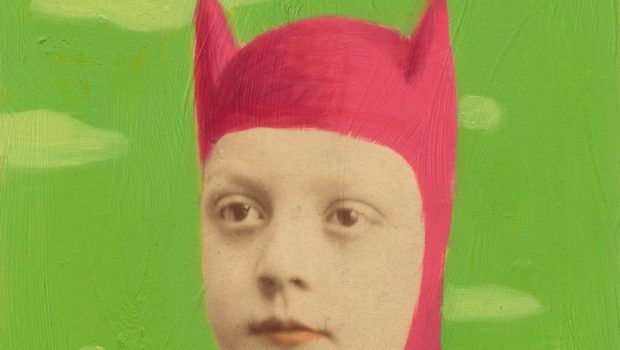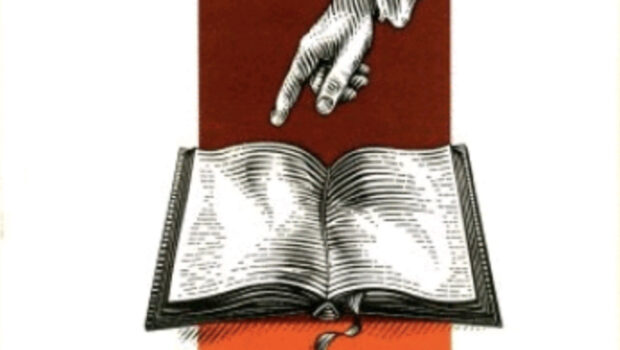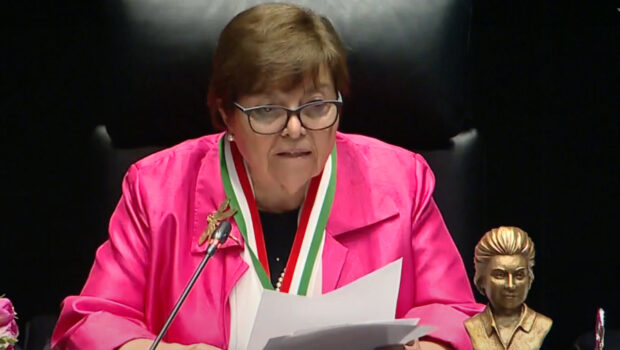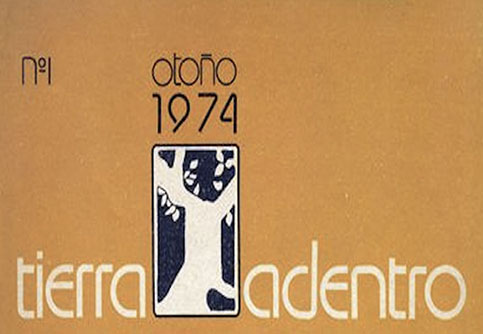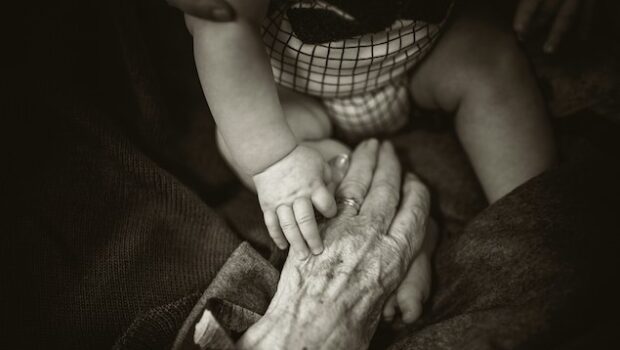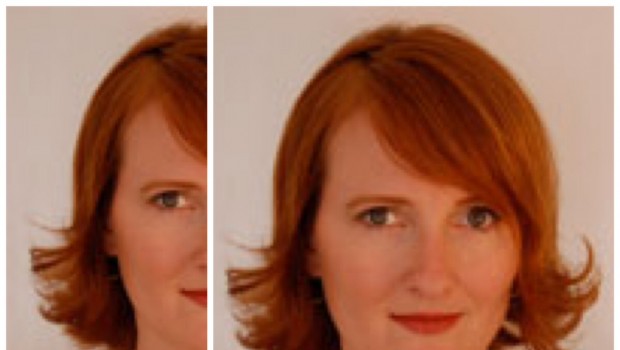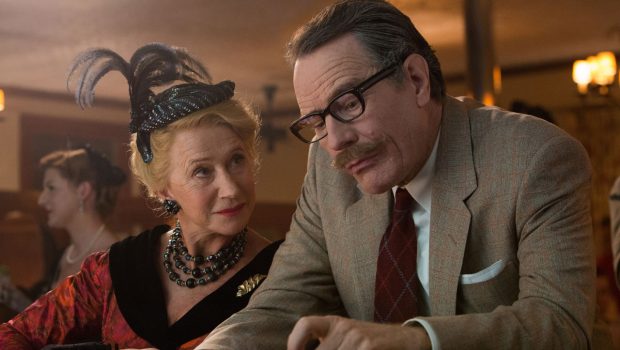Bell of Rose-coloured Fire
Campana de fuego rosa
Adriana Díaz Enciso
Pendant que les fonds publics
s’ecoulent en fêtes de fraternité, il sonne
une cloche de feu rose dans les nuages.
Arthur Rimbaud
Last year I applied for a grant from the Arts Council of England. I was spurred by the need, shared by most writers, of financial support to be able to devote to our writing the time and concentration it deserves. My grant project was the novel I am currently writing.
In December, I received the letter telling me that I hadn’t succeeded. I hasten to clarify that it is not my intention here to question why the grant wasn’t given to me. We all know that literary grants and competitions are a lottery. There are a number of reasons why our projects may not be favoured. For instance, that they are not to the judges’ taste; that the judges have no knowledge of our career; that our vision of what literature is differs; of course, that the support is awarded to better projects, and so on.
I would be most foolish if I wrote an article to complain that a grant or award has been denied to me. I’ve never stooped so low, and I have no intention to start now.
Let’s remove then the personal element in this matter. That my project didn’t get the support doesn’t matter (I mean, it matters to me, but it’s of no relevance to you reading this). I want to focus instead on the reasons adduced in the decision letter, because I think they reflect the Arts Council’s concept or artistic creation, which, in turn, echoes the parameters of the society we live in, and that does deserve indeed a public discussion.
This is a rather complex matter. Institutions such as the Arts Council, who call themselves champions and promoters of culture, while they do fulfil their mission honourably in many cases—a merit that I will in no way deny—are simultaneously transforming the visible surface of that culture, contributing to the contempt, concealment and negation that prevail in our society of everything that lives beneath the surface: depth, precisely, and the complexity that sustains any genuine work of art.
I cannot say that I was surprised by the Arts Council’s decision regarding my project. I was expecting something like that from the moment I started filling in the application form, moving forward in patient exasperation. To explain what I mean, I will share with you some of the questions that anyone who applies now for this grant will face. One of the criteria (and the most worrying one) for granting support is what they call “public engagement”, which breaks down thus:
who your project is aimed at, how they [the audience] will experience and engage with it, and how you’re going to make sure your project reaches people. . . . When we look at your answers to these questions we will think about: how strong the case for public engagement with the activity is; if the target audiences for the activity are clearly identified; if the activity increases opportunities for people who don’t currently get involved in the arts and culture or are involved a little in arts and cultural activity; if the activity increases opportunities for people already engaged in arts activity; if plans to market the activity to audiences/participants are well defined, and are likely to achieve your aims; if there is no immediate opportunity to involve people (for example, research and development), whether there is potential for the public to get involved in the future; and where relevant, whether access and diversity have been considered effectively
This section is illustrative of the conceptual problems that doom the Arts Council’s good intentions to failure. The rest of the application form makes things even clearer. Artists and authors are asked which specific groups of audience they’re addressing, which includes whether the “activity” is aimed at an identified ethnic group; to disabled people or individuals or groups with a particular sexual orientation identity; whether it’s aimed at male, female or trans people.
The offensive continues: “How will people engage with your project and what experience do you want them to have?” They also wanted to know what, specifically, people would get from my project.
“Here we go again”, I told myself, as I read the outrageous questions, and perhaps I should have desisted then and there. But, on the one hand, the need of support was (and is) big. On the other, I was tempted to test the inflexibility, not to talk of the absurd, of such criteria—deeply mistaken when what is at stake is the evaluation of artistic creation. Patiently, I explained:
This is a straightforward literary project: writing a book. The audience will engage as readers. The experience of reading is intimate and not easily measurable. Literature nurtures our life over a long period of time, in ways that, luckily, cannot be quantified or assessed against a target.
What I hope is that my readers will find meaning in this novel, that it will touch them—emotionally, intellectually—and that it will stir their imagination, as well as encouraging some reflections about the nature of reality and our relationship with the world.
And sure enough, by the time I had written these words I knew already that it was the perfect answer to miss any opportunity to obtain the grant, but it seemed to me that honesty was of essence; that I ought to at least attempt to start a dialogue that wasn’t taking place; that it was important to make it clear that not because we apply for grants should it be assumed that artists and writers passively accept the criteria of the organisations that award them.
In the section referring to the marketing and promotion plans for the project, I responded that I had got in touch with three publishers, sending them a synopsis of the novel and an advance of the first chapters, and that if none of them was interested I’d keep on looking for others. I suggested that obtaining the grant might be helpful to make publishers or agents interested in the project. I mentioned book launches and readings once the book was published, working closely with the publisher in the promotion plan, and in-person and online venues that I knew I could count on.
But then I was asked to calculate how many people would benefit from my project. Just imagine! Finally, I had to say how would I assess its success.
Again, I tried to state clearly what should be obvious:
In terms of public engagement, it will start when the book is published. Since I
am applying for a grant that would give me the support I need to finish the first
draft of the novel in one year, public engagement would come after the project
is finished, through a series of readings/talks about the novel and book launch
events.
The relationship between a book and its readers takes time, and I truly don’t
believe it can be quantified or adjusted to targets, but of course readings and
book launch events are good indicators of what the book is offering to its
readers.
What else could I say? There was certainly no way to embellish or artificially magnify my evident and straightforward intention of devoting my time and efforts to practice my trade, which is writing, and I felt very uncomfortable as I sensed that that was exactly what they were asking me to do.
When I received the decision letter, it informed me in a blanket paragraph that my application hadn’t succeeded, since it was comparatively weak in relation to others, and then it expounded the judges’ observations:
The applicants’ strong track record was noted. However the application would have been strengthened by more detail about the target audience and plans for reaching them, with or without a publisher on board.
I was also invited to apply again, as long as I rectified what, in the judges’ eyes, were the project’s flaws.
As I’ve already said, I wasn’t surprised, but at the same time I had this sensation of not understanding what it was that they didn’t understand, or what they expected from an author. I needed the support in order to write a book; not to promote it once it was finished (counting one’s chickens before hatched, as long as the book hasn’t been written); not for launching a marketing campaign; not for a plan to visit schools, “have online presence”, post videos in YouTube or what not. I needed, as so many authors in the world do, a kind of material support that would be translated into mental peace to, simply, be able to write.
Bestowing such support should be the main objective of any grant that is announced as having that end, and the Arts Council’s grants are promoted that way. Its judges and officers cannot be so disengaged from reality that they don’t know the obstacles that artists and authors already face at the best of times in a cultural milieu that is measured by numbers, marketing achievements and meritocracy in the obscenely competitive atmosphere of our vanity fair. They should know that what most creators most desperately need is mental space so that they can abstract themselves from all that noise during the process of creation; that there is no true work of art that can be created while you’re thinking of its promotion. Even having to explain this to them is grotesque.
Obviously, all artists want an audience for their work, and all of us authors want readers. We do what we can to publish our books, no doubt we want to publish them, and we strive to do so even when, given the rules of the publishing market, the odds are stacked against us. But all that comes afterwards. Creation itself does not admit such distractions. That is precisely why grants are necessary.
The Arts Council of England is a public, government-funded body whose ostensible objective is the promotion of the performing, visual and literary arts. That is to say, it administers public money, and has therefore the responsibility to do what it claims to do. And it cannot do what it claims to do if it doesn’t find out which are the foundations of artistic creation.
I understand they mean well, and that many of its officials, who award so much money to so many people every year, will probably be shocked if someone dares to tell them that they don’t know what they’re doing. But we all know that good intentions are not enough if they lack a solid foundation. I understand the difficulty of their task, the complexity in having to be accountable for concrete moneys and infrastructure while they’re engaged with the ungraspable nature of the arts. They may believe that, precisely because they manage public funds, they have to show results that are verifiable in terms of countable targets and aims, but this is a catastrophic misunderstanding of their public duty.
Promoting culture as widely as possible isn’t precisely the same as—to use a current reference—a vaccination programme. Quantitative issues do matter, but not at the expense of the qualitative. The duty of an institution with these aims is to help the public understand that art and literature transcend limits, rather than making them believe that they impose them; that art and literature are the shared fruits of a freedom born out of moments that are almost miraculous in their mystery and improbability—intellectual freedom; spiritual, if we believe in the spirit, existential in any case. A capacity to appreciate subtlety, a profound understanding of the process of creation, and a virtuous balance between practical and creative considerations are what is needed if you really want to support the arts.
Identifying the “target” reader? I don’t give a shit if my readers are men, women, gay, heterosexual, trans, black, white, blue or green. That they are human is enough to me. I cannot sit at my desk wondering how the book I am writing will be “useful” for this or that minority. My work is not utilitarian, because literature, by definition, isn’t either, and I find it alarming that a public body tells any artist or author that a creative project is deemed weak because it doesn’t prioritise its promotion or doesn’t fit an equivocal programme of what would seem to be social work. And it is alarming because all these righteous criteria do is to suffocate the very essence of art.
What must be universal is education and access to absolutely everybody—if they so wish—to artistic expression, but while it is laudable that artists and authors are willing to collaborate with institutions and media to achieve this end (and I believe most are), and many in fact work in the education sector, in what concerns the work itself, their job is no other than creation, and to do it in freedom is imperative.
The problem is deep; it has always been there, and it’s philosophical, rather than one of budget. Perhaps it has no solution, but as a society we ought to keep on wondering what the real value of the arts for human existence is.
A couple of years ago I was complaining, talking with some very dear friends who are also authors, saying that authors had never been so humiliated as we are now, in these delirious times ruled by the celebrity culture and unbridled mercantilism. One of them, Verónica Murguía, whose knowledge of history is profound, wisely reminded me that this isn’t true. We have always been humiliated, in innumerable ways. She asked me what I thought, for instance, of the ancient Persian habit of making the court’s poets stuff their mouth with gold coins, mentioned, among other sources, in Amin Maalouf’s beautiful novel Samarkand. Verónica was right; the different embodiments of power have always been on a war footing—an ambivalent, yet not for it less gory war—with art.
Perhaps what I now find so abhorrent is the sophistication of the lie; the fact that we say we have come a long way; that luckily artists and authors don’t depend on the court anymore; that now all over the world there are institutions such as the Arts Council that make of the support of the arts an objective and worthy social duty. No doubt many of them do, but as long as the officials in such institutions turn their back on the existential core of art’s nature, and endeavour to use the parameters, the language and the logic of the market and the purely quantitative estimation of human experience, they’ll end up becoming the courts of yesteryear.
I have idly wondered what would have been, for instance, Emily Brontë’s fate had she applied for an Arts Council grant to write Wuthering Heights: “I’m going to write a novel packed with physical and psychological violence, a ‘compound of vulgar depravity and unnatural horrors’”(as described in a review for Graham’s Lady Magazine). “It will be brutal, incredibly dark, and many publishers will reject it. When I finally manage to publish it, don’t count on me for the promotion: I am very shy; rebellious, too, and frankly I prefer the moors and animals to humans. Turning my back on the world, in my beloved Yorkshire—that’s where I like to be, thank you very much.”
The temptation to imagine other grant applications by authors of great novels who would be rejected for disregarding the game rules is big; you may imagine others (though there may even be those who tell me that Brontë didn’t deserve the grant, writing as she was a novel that fit into the white Western canon). It may not be, though, such an idle pastime as it seems: it reveals to us that virtually none of the authors of the greatest novels in the history of literature would have met the Arts Council’s requirements, and that most would have found them offensive; it also underlines a reality which should be obvious for anyone who has literary interests: great literature isn’t written like this, thinking of “target readers”, of the amount of readers that the book will have, therefore integrating it “in the community” and serving all sorts of arbitrary categories of human groups, nor thinking of what will have to be done so that it has a great promotion. I don’t believe there is a single work of art, a single literary work of any merit, that has ever been created this way, and there never will be.
Those who draft the application forms for grants such as these don’t seem to have the faintest awareness of the silence and intimacy that literary creation, and reading, demand, nor of what is the nature of the true value—ungraspable but utterly powerful—of art for individuals and society.
As I’ve already said, the Arts Council of England has of course supported many worthy artists and projects; I don’t want to detract from their work, and I would furthermore be ungrateful, for many years ago, in 2003, they granted me a modest support to begin a project. The problem is that the incentives bestowed by this institution are, in my view, indiscriminate, ever more orientated towards the quantitative and populist parameters which constitute the antithesis of artistic creation.
I think that many of us authors ask ourselves, every time we apply for a grant, whether that’s the right way to sustain our work, for every single application is, one way or another, a negotiation with power. At the same time, we have precious little other options to find the space and silence which, as we’ve already seen, are so necessary for our work, and not many other options for our survival either.
These incentives matter, and ideally both authors and institutions would learn to navigate this negotiation’s often murky waters with equanimity, balance, and a profound awareness of what is at stake. That institutions such as the Arts Council of England abdicate that balance and that awareness in order to adhere more and more to the inane and coarse vision of art that pervades our society is a serious issue. It means the increase of support and, therefore, of visibility, to tailor-made projects, at the expense of those works created with creative freedom as their sustenance. Little by little, like rain eroding rocks, such automatization, levelling and taming of art become the ruling vision, leaving society orphaned of a benefit that should be inalienable.
Perhaps there is no solution; perhaps this path has always been, will always be like this, made of infinite obstacles and chasms, from the threat of having to stuff your mouth with coins almost to choking point, to the farce of pretending that you can plan the number of readers that your book will have.
In any case, though the decision letter I received for my project invites me to apply for the grant again, once I’ve amended my faults, I’m not going to do it. I won’t do it because I have no interest in making up the answers the judges want to hear; because I’m not willing to contribute to such a misunderstanding; because I believe that we, artists and authors, have not only the right, but the obligation to make anyone who call themselves champions and promoters of culture understand that complying with arbitrary rules just to obtain some coins, golden or otherwise, is not part of our job. If looking for publishers, collaborating with them in their promotion plans, organising book launches and public readings of your work is not enough, what kind of carnival are we being coerced to join? It is my belief that, of carnivals, we have enough, and I have no interest to add my voice to the racket. More than a doubtful second chance, what matters to me is to find a public space to discuss this issue, and to shout from the roof tops that the task of those organisations that support and promote art and literature is not—to paraphrase William Blake regarding Sir Joshua Reynolds—to depress art.
 Adriana Díaz-Enciso es poeta, narradora y traductora. Ha publicado las novelas La sed, Puente del cielo, Odio y Ciudad doliente de Dios, inspirada en los Poemas proféticos de William Blake; los libros de relatos Cuentos de fantasmas y otras mentiras y Con tu corazón y otros cuentos, y seis libros de poesía. Su más reciente publicación, Flint (una elegía y diario de sueños, escrita en inglés) puede encontrarse aquí.
Adriana Díaz-Enciso es poeta, narradora y traductora. Ha publicado las novelas La sed, Puente del cielo, Odio y Ciudad doliente de Dios, inspirada en los Poemas proféticos de William Blake; los libros de relatos Cuentos de fantasmas y otras mentiras y Con tu corazón y otros cuentos, y seis libros de poesía. Su más reciente publicación, Flint (una elegía y diario de sueños, escrita en inglés) puede encontrarse aquí.
©Literal Publishing. Queda prohibida la reproducción total o parcial de esta publicación. Toda forma de utilización no autorizada será perseguida con lo establecido en la ley federal del derecho de autor.
Las opiniones expresadas por nuestros colaboradores y columnistas son responsabilidad de sus autores y no reflejan necesariamente los puntos de vista de esta revista ni de sus editores, aunque sí refrendamos y respaldamos su derecho a expresarlas en toda su pluralidad. / Our contributors and columnists are solely responsible for the opinions expressed here, which do not necessarily reflect the point of view of this magazine or its editors. However, we do reaffirm and support their right to voice said opinions with full plurality.
Pendant que les fonds publics
s’ecoulent en fêtes de fraternité, il sonne
une cloche de feu rose dans les nuages.
Arthur Rimbaud
El año pasado solicité una beca del Arts Council of England. Mi acicate fue la necesidad, compartida por la gran mayoría de los escritores, de apoyo financiero para poder dedicarle a nuestra escritura el tiempo y la concentración que merece. Mi proyecto de beca era la novela que estoy escribiendo actualmente (en inglés).
En diciembre recibí la carta informándome que no había sido seleccionada. Me apresuro a aclarar que la intención de estas notas no es cuestionar por qué la beca no se me otorgó a mí. Todos sabemos que las becas y los concursos literarios son una lotería. Hay una multitud de motivos por los que nuestros proyectos pueden no ser elegidos; por ejemplo, que no son del gusto del jurado; que el jurado no conoce nuestra trayectoria; que nuestra visión de lo que es la literatura es distinta; por supuesto, que se otorga el apoyo a proyectos mejores, y un largo etcétera.
Sería una insensata si escribiera un artículo para quejarme porque se me ha negado una beca o un premio. Nunca he caído en semejante bajeza, y no voy a empezar ahora.
Quitemos entonces el elemento personal de la historia. Que mi proyecto no obtuviera el apoyo no importa (es decir: me importa a mí, pero no tiene relevancia para ustedes, lectores). Quiero concentrarme en cambio en los motivos aducidos en la carta de decisión, porque creo que reflejan la concepción que tiene el Arts Council de la creación artística, eco a su vez de los parámetros de la sociedad en que vivimos, y eso sí que merece una discusión pública.
La cuestión es sumamente compleja. Instituciones como el Arts Council, que se dicen defensoras y promotoras de la cultura, si bien cumplen su cometido de manera digna en muchos casos (mérito que agradezco y que de ninguna forma voy a negar), están simultáneamente transformando la superficie visible de esa cultura, contribuyendo al desdén, el ocultamiento y la negación imperantes en nuestra sociedad de todo lo que vive por debajo de la superficie: la hondura, justamente, y la complejidad que sustentan cualquier creación artística genuina.
No puedo decir que la decisión del Arts Council sobre mi proyecto me haya sorprendido. Me esperaba algo así desde que empecé a llenar la forma de solicitud, por la que avanzaba con paciente exasperación. Para explicarme, compartiré con ustedes algunas de las preguntas a que se enfrenta hoy día cualquiera que solicite esta beca. Uno de los criterios (y el más preocupante) para otorgar el apoyo es el de lo que llaman “compromiso público”, desglosado de la siguiente forma:
A quién está dirigido tu proyecto; cómo será experimentado [por el público] y cómo participará del mismo, y cómo vas a garantizar que tu proyecto llegue a la gente. [. . .] Cuando veamos tus respuestas a estas preguntas, consideraremos la solidez de los argumentos respectivos a la participación del público; si el público destinatario está claramente identificado; si la actividad aumenta las oportunidades para gente que actualmente no se involucra, o se involucra poco con, la actividad artística y cultural; si la actividad aumenta oportunidades para la gente que ya está involucrada con actividades artísticas; si están bien definidos los planes para comercializar la actividad entre el público/los participantes, y si es probable que alcances tu meta; en caso de que no exista una posibilidad inmediata de involucrar a la gente (por ejemplo, investigación o desarrollo), si hay potencial para que el público se involucre en el futuro, y, donde sea relevante, si se han considerado efectivamente la accesibilidad y diversidad.
Es una sección ilustrativa de los problemas conceptuales que destinan las buenas intenciones del Arts Council, como promotor del arte, al fracaso. El resto de la solicitud deja las cosas aún más claras. A artistas y escritores se les pregunta a qué grupos específicos de público se dirigen, incluyendo si “la actividad” está dirigida a algún grupo étnico identificado; a personas discapacitadas o a individuos o grupos con una identidad de orientación sexual particular; si a personas del sexo masculino, femenino o trans.
La ofensiva sigue: “¿cómo se involucrará la gente con tu proyecto, y qué experiencia quieres que tengan? Dinos de qué forma se involucrará la gente o el público, y qué obtendrán de tu proyecto.”
“Ya empezamos”, me dije, mientras leía las inauditas preguntas, y quizá debí haber desistido entonces. Pero, por un lado, la necesidad de apoyo era (y es) grande. Por otro, me entró la tentación de poner a prueba la rigidez, por no hablar del absurdo, de estos criterios profundamente equivocados cuando se trata de evaluar la creación artística. Con paciencia expliqué:
Éste es simplemente un proyecto literario: escribir un libro. El público se involucrará en forma de lectores. La experiencia de la lectura es íntima y no es fácil de medir. La literatura nutre nuestra vida durante largos periodos de tiempo, de maneras que, afortunadamente, no pueden ser cuantificadas ni evaluadas según un objetivo. Lo que espero es que mis lectores encuentren significado en esta novela, que los toque —emocional e intelectualmente— y que incite su imaginación, a la vez que aliente la reflexión sobre la naturaleza de la realidad y nuestra relación con el mundo.
Y claro está, para cuando escribí estas palabras ya sabía que era la respuesta justa para perder toda oportunidad de obtener la beca, pero me pareció que la honestidad era fundamental; que había que intentar al menos entablar un diálogo que no estaba teniendo lugar; que era importante dejar claro que no porque pidamos becas tiene que asumirse que artistas y escritores aceptamos pasivamente los criterios de los organismos que las otorgan.
En el apartado sobre los planes de mercadotecnia y difusión para el proyecto, respondí que me había puesto en contacto con tres editoriales, enviándoles una sinopsis de la novela y un adelanto de los primeros capítulos, y que si ninguna estaba interesada seguiría buscando otros editores. Aclaré que, si obtenía el apoyo de la beca, podría ayudar a que editoriales o agentes se interesaran en el proyecto. Hablé de presentaciones del libro y lecturas una vez publicado, de trabajar estrechamente con la editorial en su plan de promoción, de espacios presenciales y en línea con los que sabía que podía contar.
Pero entonces se me pedía que calculara cuánta gente se beneficiaría de mi proyecto. ¡Imagínense! Finalmente, tenía que responder cómo evaluaría el éxito del mismo.
De nuevo, intenté exponer con claridad lo que debía ser obvio:
En lo que toca a la participación del público, ésta iniciará una vez que el libro esté publicado. Puesto que estoy solicitando una beca que me proporcionaría el apoyo que necesito para terminar el primer borrador de la novela en un año, la participación pública vendría una vez que el proyecto esté terminado, mediante una serie de charlas, lecturas y presentaciones de la novela.
La relación entre un libro y sus lectores se lleva tiempo, y realmente no creo que pueda ser cuantificada o ajustarse a objetivos, aunque por supuesto las lecturas y presentaciones son un buen indicador de lo que el libro les ofrece a sus lectores.
¿Qué más podía decir? Ciertamente no había forma de adornar o engrandecer artificialmente mi evidente y sencilla intención de dedicar mi tiempo y esfuerzo a ejercer mi oficio, que es el de escritora, y me sentía muy incómoda al presentir que eso era justamente lo que me estaban pidiendo.
Cuando me llegó la carta de decisión, se me informaba en un párrafo general que mi solicitud no había tenido éxito, ya que era comparativamente más débil en relación a otras, y ahondaba en las observaciones del jurado:
Se reconoció la sólida trayectoria de la solicitante. Sin embargo, la solicitud se habría visto fortalecida con mayor información sobre el público objetivo y los planes para llegar a él, con o sin una editorial.
Me invitaban también a volver a hacer la solicitud, siempre y cuando rectificara éstas que, a ojos del jurado, eran flaquezas del proyecto.
Como ya dije, no me sorprendí, pero al mismo tiempo me quedé con la sensación de no entender qué era lo que ellos no entendían, o lo que esperaban de una escritora. Yo necesitaba el apoyo para escribir un libro; no para promoverlo una vez terminado (las cuentas de la lechera, mientras el libro no esté escrito); no para una campaña de mercadotecnia; no para un plan de visitar escuelas, “tener presencia en la red”, hacer videos en YouTube o qué sé yo. Necesitaba, como tantísimos escritores en el mundo, un apoyo que se vería traducido en paz mental para, simplemente, poder escribir.
Proporcionar ese apoyo debería ser el objetivo principal de cualquier beca que se anuncie con ese fin, y las del Arts Council así se promueven. Sus jurados y funcionarios no pueden estar tan desconectados de la realidad que no sepan los obstáculos que ya enfrentan de por sí artistas y escritores en un entorno cultural que se mide por números, logros mercadotécnicos y meritocracia en la atmósfera obscenamente competitiva de nuestra feria de vanidades. Deberían saber que lo que la mayoría de los creadores necesitan desesperadamente es espacio mental para poder abstraerse de todo ese ruido durante el proceso de creación; que no hay obra de arte verdadera que pueda ser creada mientras se piensa en su promoción. Tener incluso que explicárselo es grotesco.
Por supuesto, todos los artistas quieren que su obra tenga un público, y todos los autores queremos lectores. Los escritores hacemos lo que podemos por publicar nuestros libros, sin duda queremos publicarlos, y nos empeñamos en hacerlo aun cuando, ante las reglas del mercado editorial, parezca que tenemos todo en contra. Pero todo eso viene después. La creación en sí no admite semejantes distracciones. Es por eso, justamente, que el este tipo de becas son necesarias.
El Arts Council of England es una institución pública, financiada por el gobierno, cuyo objetivo ostensible es la promoción de las artes escénicas, visuales y literarias. Es decir, administra fondos públicos, y por lo tanto tiene la responsabilidad de hacer lo que dice que hace. Y no puede hacer lo que dice si no se entera de cuáles son los fundamentos de la creación artística.
Entiendo que la intención es buena, y que muchos de sus funcionarios, que otorgan tantísimo dinero a tanta gente todos los años, probablemente se escandalizarían si alguien se atreve a decirles que no saben lo que hacen. Pero todos sabemos que las buenas intenciones no bastan si están mal fundamentadas. Entiendo la dificultad de su labor, la complejidad de tener que rendir cuentas de finanzas e infraestructura concretas a la vez que tratan con la naturaleza inaprensible del arte. Ellos creerán que, justamente porque sus fondos son públicos, tienen que arrojar resultados comprobables en términos de metas y objetivos contables, pero esto es malentender de manera catastrófica su función pública.
Promover la cultura lo más ampliamente posible no equivale precisamente —para utilizar un referente actual— a un programa de vacunación. Importan, sí, las consideraciones cuantitativas, pero no a costa de las cualitativas. El deber de una institución que obedece a este fin es ayudar a la población a entender que el arte y la literatura trascienden límites, no hacerles creer que los imponen; que el arte y la literatura son los frutos compartidos de momentos casi milagrosos, en su misterio e improbabilidad, de libertad: libertad intelectual, espiritual si creemos en el espíritu, existencial de cualquier forma. Capacidad de apreciar la sutileza, una comprensión profunda de lo que es el proceso de creación, y un equilibrio virtuoso entre las consideraciones prácticas y las creativas es lo que hace falta si se quiere realmente apoyar a las artes.
¿Identificar al público lector “meta”? A mí no me importa un carajo si mis lectores son hombres, mujeres, gay, heterosexuales, trans, negros, blancos, azules o verdes. Con que sean humanos me basta. Yo no puedo sentarme a escribir preguntándome cómo el libro en cuestión será “útil” para tal o cual minoría. Mi trabajo no es utilitario, porque la literatura, por definición, no lo es, y me parece alarmante que una institución pública le diga a cualquier artista o autora que un proyecto creativo es considerado débil porque no da prioridad a su promoción ni se adecúa a un programa equívoco de lo que parecería ser asistencia social. Y es alarmante porque lo único que logran estos criterios biempensantes es sofocar la esencia misma del arte.
Lo que debe ser universal es la educación y el acceso de absolutamente todas las personas—si así lo desean—a las manifestaciones artísticas, pero si bien es loable que artistas y escritores estén dispuestos a colaborar con los medios e instituciones para lograr este fin (y creo que la mayoría lo están), y muchos trabajan de hecho en el sector educativo, en lo que toca a la obra en sí, su trabajo no es otro que crear, y es imperativo hacerlo en libertad.
El problema es hondo; ha existido siempre y no es presupuestal, sino filosófico. Quizá no tiene remedio, pero como sociedad nos toca seguirnos preguntando cuál es el verdadero valor de las artes para la existencia humana.
Hace un par de años me quejaba con algunas queridas amigas, autoras también, de que los escritores nunca habíamos sido tan humillados como en estos tiempos delirantes gobernados por la cultura de la celebridad y un mercantilismo desaforado. Una de ellas, Verónica Murguía, siempre conocedora profunda de la historia, me recordó sabiamente que eso no es verdad. Humillados hemos sido siempre, de innumerables maneras. Me preguntó qué pensaba, por ejemplo, de la antigua costumbre persa de hacer que los poetas de la corte se llenaran la boca de monedas de oro, mencionada entre otras fuentes en la hermosa novela Samarcanda, de Amin Maalouf. Verónica tenía razón; las distintas formas del poder siempre han estado en pie de guerra—una guerra ambivalente, pero no por ello menos cruenta—con el arte.
Quizá lo que ahora encuentro tan aberrante es la sofisticación de la mentira; el que digamos que hemos avanzado; que por fortuna los artistas y escritores ya no dependemos de la corte; que ahora existen en casi todo el mundo instituciones como el Arts Council que hacen del apoyo al arte una labor social objetiva y digna. Sin duda muchas lo hacen, pero mientras los funcionarios en dichas instituciones vuelvan la espalda al meollo existencial de la naturaleza del arte, y se empeñen en utilizar los parámetros, el lenguaje y la lógica del mercado y de la valoración puramente cuantitativa de la experiencia humana, terminarán convirtiéndose en las cortes de antaño.
Ociosamente me he preguntado cuál habría sido la suerte de, por ejemplo, Emily Brontë, si hubiera pedido una beca del Arts Council para escribir Cumbres borrascosas: “Voy a escribir una novela cargada de violencia, física y psicológica, una ‘mezcla de depravación vulgar y horrores contranaturales’” (palabras de una reseña en Graham’s Lady Magazine). “Será brutal, increíblemente oscura, y la rechazarán muchas editoriales. Cuando al fin logre publicarla, no cuenten conmigo para la promoción: soy muy tímida; rebelde también, y francamente prefiero el brezal y a los animales que a los humanos. De espaldas al mundo, en mi amado Yorkshire, es donde estoy mejor, muchas gracias.”
Es grande la tentación de imaginar otras solicitudes de beca de autores de grandes novelas que serían rechazadas por no cumplir con las reglas del juego; ustedes se podrán imaginar otras (aunque puede haber incluso quién me diga que Brontë no se merecía la beca, cuando estaba escribiendo una novela que se ajustaría al canon blanco occidental). Quizá no sea un pasatiempo tan ocioso como parece: nos revela que prácticamente ninguno de los autores y autoras de las más grandes novelas en la historia de la literatura habría cumplido con los requisitos del Arts Council, y que la mayoría los habrían encontrado ofensivos; evidencia también una realidad que debería ser obvia para quienquiera que tenga intereses literarios: la gran literatura no se escribe así, pensando en “lectores meta”, en la cantidad de lectores que el libro tendrá, integrándose así “en la comunidad” y sirviendo a todo tipo de categorías arbitrarias de grupos humanos, ni pensando en lo que tendrá que hacerse para que tenga mucha difusión. No creo que exista una sola obra de arte, ni una sola obra literaria de mérito, que haya sido creada de esta forma, y no la habrá nunca.
Quienes redactan los formularios de solicitud de becas como las que nos ocupan no parecen tener la más remota conciencia del silencio y la intimidad que la creación literaria, y la lectura, exigen, ni tampoco de cuál es la naturaleza del verdadero valor, inasible pero poderosísimo, del arte para los individuos y la sociedad.
Como ya he dicho, por supuesto que el Arts Council of England ha apoyado a muchos artistas y proyectos dignos; no quiero restarle méritos a su labor, y pecaría además de ingrata, pues hace muchos años, en 2003, recibí de ellos un modesto apoyo para iniciar un proyecto. El problema es que los estímulos que brinda la institución son, a mi vista, indiscriminados, orientados cada vez más hacia los parámetros cuantitativos y populistas que son la antítesis de la creación artística.
Creo que somos muchos los autores y autoras que, cada que pedimos una beca, nos preguntamos si ésa es la forma adecuada de sustentar nuestra labor, pues cada solicitud es, de una forma u otra, una negociación con el poder. Al mismo tiempo, tenemos muy pocas otras opciones para encontrar el espacio y el silencio que, ya hemos visto, son tan necesarios para nuestro trabajo, y no muchas otras opciones tampoco para nuestra supervivencia si queremos dedicarnos seriamente al trabajo literario.
Estos estímulos importan, y lo ideal sería que tanto los autores como las instituciones aprendieran a navegar las aguas a menudo turbias de esta negociación con ecuanimidad, equilibrio, y una conciencia profunda de lo que está en juego. Que instituciones como el Arts Council of England abdiquen de ese equilibrio y esa conciencia para ceñirse cada vez más a la visión inane y burda del arte que impera en nuestra sociedad es asunto grave. Significa el incremento de apoyo y, por lo tanto, de visibilidad, a proyectos hechos a medida, en detrimento de aquellas obras creadas con la libertad creativa como sustento. Poco a poco, como lluvia que erosiona la piedra, esta automatización, igualación y domesticación del arte se van convirtiendo en la visión imperante, dejando a la sociedad huérfana de un bien que le debería ser inalienable.
A lo mejor no hay remedio; a lo mejor siempre ha sido y será así este camino, hecho de obstáculos y abismos infinitos, desde la amenaza de tener que llenarte la boca de monedas hasta casi asfixiarte, hasta la farsa de pretender que se puede planear la cantidad de lectores que va a tener tu libro.
Sea como sea, aunque en la carta de decisión que recibí por mi proyecto se me invita a volver a solicitar la beca, una vez enmendadas mis faltas, no lo voy a hacer. No lo haré porque no tengo ningún interés en ponerme a inventar las respuestas que los jurados quieren oír; porque no estoy dispuesta a contribuir a este mayúsculo malentendido; porque creo que artistas y escritores tenemos no solamente el derecho, sino la obligación de hacer entender a quien quiera que se diga defensor y promotor de la cultura que acatar normas arbitrarias con tal de conseguir unas monedas, sean de oro o no, no es parte de nuestro trabajo. Si buscar editoriales, colaborar con ellas en sus planes de promoción, hacer presentaciones de tu libro y lecturas públicas no es suficiente como la manera lógica y digna en que una autora puede promover su obra, ¿en qué tipo de carnaval estamos siendo conminados a participar? Yo creo que de carnavales ya tenemos suficiente, y no me interesa unir mi voz al barullo. Más que una dudosa segunda oportunidad, me importa buscar un espacio público de discusión del tema, y gritar a los cuatro vientos que la función de los organismos dedicados al apoyo y la promoción del arte y la literatura no es, parafraseando a William Blake al referirse a Sir Joshua Reynolds, deprimir el arte.
 Adriana Díaz-Enciso es poeta, narradora y traductora. Ha publicado las novelas La sed, Puente del cielo, Odio y Ciudad doliente de Dios, inspirada en los Poemas proféticos de William Blake; los libros de relatos Cuentos de fantasmas y otras mentiras y Con tu corazón y otros cuentos, y seis libros de poesía. Su más reciente publicación, Flint (una elegía y diario de sueños, escrita en inglés) puede encontrarse aquí.
Adriana Díaz-Enciso es poeta, narradora y traductora. Ha publicado las novelas La sed, Puente del cielo, Odio y Ciudad doliente de Dios, inspirada en los Poemas proféticos de William Blake; los libros de relatos Cuentos de fantasmas y otras mentiras y Con tu corazón y otros cuentos, y seis libros de poesía. Su más reciente publicación, Flint (una elegía y diario de sueños, escrita en inglés) puede encontrarse aquí.
©Literal Publishing. Queda prohibida la reproducción total o parcial de esta publicación. Toda forma de utilización no autorizada será perseguida con lo establecido en la ley federal del derecho de autor.
Las opiniones expresadas por nuestros colaboradores y columnistas son responsabilidad de sus autores y no reflejan necesariamente los puntos de vista de esta revista ni de sus editores, aunque sí refrendamos y respaldamos su derecho a expresarlas en toda su pluralidad. / Our contributors and columnists are solely responsible for the opinions expressed here, which do not necessarily reflect the point of view of this magazine or its editors. However, we do reaffirm and support their right to voice said opinions with full plurality.



